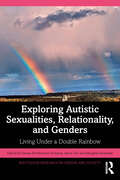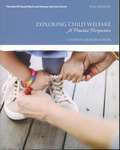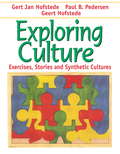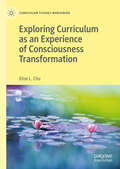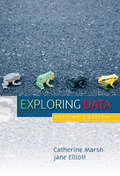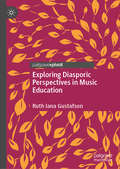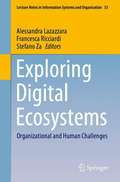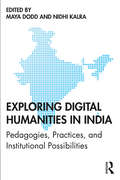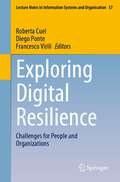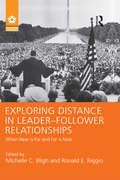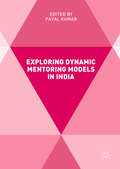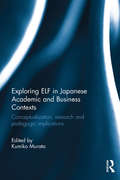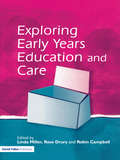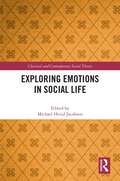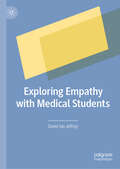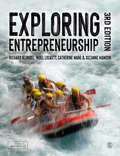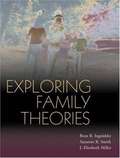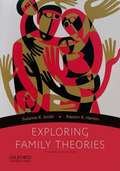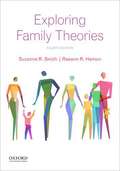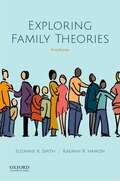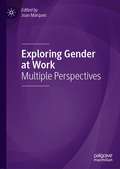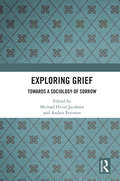- Table View
- List View
Exploring Autistic Sexualities, Relationality, and Genders: Living Under a Double Rainbow (Routledge Research in Gender and Society)
by Hanna Bertilsdotter RosqvistThis edited collection of contributions explores non-normative genders, sexualities, and relationality among Autistic people.Written within an explicitly neuro-affirmative frame, the collection celebrates the diversity and richness of Autistic identity, sexuality, gender, and relationships, exploring areas such as consent, embodiment, ink, kink, sex education, and therapeutic work. All editors and contributors are neurodivergent and members of the communities that the book focuses on, providing an authentic and unique exploration of gender, sexuality, and relationality in Autistic people by Autistic/other neurodivergent authors.The book is primarily intended for postgraduate students and academics across disciplines including sociology, social work, psychology, disability studies, inclusive and special education, and sexual education. Mental health professionals and educators will also find it a useful resource to support their Autistic clients as well as developing their own understanding about how to support Autistic people in a neurodiversity-affirming, kink-affirming, LGBTQ+, and gender-variant way.
Exploring Child Welfare: A Practice Perspective
by Cynthia Crosson-TowerThe text emphasizes the practice perspective and features numerous case examples that allow students to get a real-life look at the population they will be serving. References to applicable social work competencies appear throughout the book to help guide readers in learning how the competencies apply to practice situations.
Exploring Creativity
by Brian Moeran Bo T. ChristensenUnder the guidance of Moeran and Christensen, the authors in this volume examine evaluative practices in the creative industries by exploring the processes surrounding the conception, design, manufacture, appraisal, and use of creative goods. They describe the editorial choices made by different participants in a 'creative world', as they go about conceiving, composing or designing, performing or making, selling and assessing a range of cultural products. The study draws upon ethnographically rich case studies from companies as varied as Bang and Olufsen, Hugo Boss, and Lonely Planet, in order to reveal the broad range of factors guiding and inhibiting creative processes. Some of these constraints are material and technical; others are social or defined by aesthetic norms. The authors explore how these various constraints affect creative work, and how ultimately they contribute to the development of creativity.
Exploring Culture: Exercises, Stories and Synthetic Cultures
by Geert Hofstede Gert Jan Hofstede Paul B. PedersenExploring Culture brings Geert Hofstede's five dimensions of national culture to life. Gert Jan Hofstede and his co-authors Paul Pedersen and Geert Hofstede introduce synthetic cultures, the ten "pure" cultural types derived from the extremes of the five dimensions. The result is a playful book of practice that is firmly rooted in theory. Part light, part serious, but always thought-provoking, this unique book approaches training through the three-part process of building awareness, knowledge, and skills. It leads the reader through the first two components with more than 75 activities, dialogues, stories, and incidents. The Synthetic Culture Laboratory and two full simulations fulfill the skill-building component. Exploring Culture is suitable for students, trainers, coaches and educators. It can be used for individual study or as a text, and it serves as an excellent partner to Geert Hofstede's popular Cultures and Organizations.
Exploring Culture: Exercises, Stories and Synthetic Cultures
by Geert Hofstede Gert Jan Hofstede Paul B. PedersenExploring Culture brings Geert Hofstede's five dimensions of national culture to life. Gert Jan Hofstede and his co-authors Paul Pedersen and Geert Hofstede introduce synthetic cultures, the ten "pure" cultural types derived from the extremes of the five dimensions. The result is a playful book of practice that is firmly rooted in theory. Part light, part serious, but always thought-provoking, this unique book approaches training through the three-part process of building awareness, knowledge, and skills. It leads the reader through the first two components with more than 75 activities, dialogues, stories, and incidents. The Synthetic Culture Laboratory and two full simulations fulfill the skill-building component. Exploring Culture is suitable for students, trainers, coaches and educators. It can be used for individual study or as a text, and it serves as an excellent partner to Geert Hofstede's popular Cultures and Organizations.
Exploring Curriculum as an Experience of Consciousness Transformation (Curriculum Studies Worldwide)
by Elise L. ChuThis book addresses the issue of de-spiritualization in education through an interdisciplinary lens. It draws on curriculum scholarship of Dwayne Huebner, Martin Heidegger’s interpretation of Plato’s allegory of the cave, Buddhism, theories and philosophies of quantum physics, and philosophical hermeneutics, among others. In doing so, the author identifies the relationship between spiritual truth and education and probes the nature of consciousness, self, and reality. On this basis, she works to explore curriculum as an experience of consciousness transformation vital to the essence and purpose of education and argues for reason with faith and faith with reason as well as the imperative of curriculum imbued with spiritual wisdom and lived experiences.
Exploring Data: An Introduction to Data Analysis for Social Scientists
by Jane Elliott Catherine MarshExploring Data: An Introduction to Data Analysis for Social Scientists, 2nd Edition The updated edition of this classic text introduces a range of techniques for exploring quantitative data. Beginning with an emphasis on descriptive statistics and graphical approaches, it moves on in later chapters to simple strategies for examining the associations between variables using inferential statistics such as chi squared. The book has been substantially revised to include the most recent approaches to data analysis, and includes step-by-step instructions on using SPSS. All these techniques are illustrated with intriguing real examples, drawn from important social research over the past three decades, designed to illuminate significant sociological and political debates. The book shows how students can use quantitative data to answer various questions: Is it true that the rich are getting richer and the poor are getting poorer? Are crime rates really going down, and how can we tell? How much alcohol do men and women really drink in an average week? Which country in Europe has the highest average working hours? Readers are encouraged to explore data for themselves, and are carefully guided through the opportunities and pitfalls of using statistical packages, as well as the numerous data sources readily available online. Suitable for those with no previous experience of quantitative data analysis, the second edition of Exploring Data will be invaluable to students across the social sciences.
Exploring Diasporic Perspectives in Music Education
by Ruth Iana GustafsonThis book challenges simplified claims of racial, national, and ethnic belonging in music education by presenting diaspora as a new paradigm for teaching music, departing from the standard multicultural guides and offering the idea of unfinished identities for musical creations. While multiculturalism—the term most commonly used in music education—had promised a theoretical framework that puts classical, folk, and popular music around the world on equal footing, it has perpetuated the values of Western aesthetics and their singular historical development. Breaking away from this standard, the book illuminates a diasporic web of music’s historical pathways, avoiding the fragmentation of music by categories of presumed origins whether racial, ethnic, or national.
Exploring Digital Ecosystems: Organizational and Human Challenges (Lecture Notes in Information Systems and Organisation #33)
by Francesca Ricciardi Stefano Za Alessandra LazazzaraThe recent surge of interest in digital ecosystems is not only transforming the business landscape, but also poses several human and organizational challenges. Due to the pervasive effects of the transformation on firms and societies alike, both scholars and practitioners are interested in understanding the key mechanisms behind digital ecosystems, their emergence and evolution. In order to disentangle such factors, this book presents a collection of research papers focusing on the relationship between technologies (e.g. digital platforms, AI, infrastructure) and behaviours (e.g. digital learning, knowledge sharing, decision-making). Moreover, it provides critical insights into how digital ecosystems can shape value creation and benefit various stakeholders. The plurality of perspectives offered makes the book particularly relevant for users, companies, scientists and governments. The content is based on a selection of the best papers – original double-blind peer-reviewed contributions – presented at the annual conference of the Italian chapter of the AIS, which took place in Pavia, Italy in October 2018.
Exploring Digital Humanities in India: Pedagogies, Practices, and Institutional Possibilities
by Nidhi Kalra Maya DoddThis book explores the emergence of digital humanities in the Indian context. It looks at how online and digital resources have transformed classroom and research practices. It examines some fundamental questions: What is digital humanities? Who is a digital humanist? What is its place in the Indian context? The chapters in the volume: • study the varied practices and pedagogies involved in incorporating the ‘digital’ into traditional classrooms; • showcase how researchers across disciplinary lines are expanding their scope of research, by adding a ‘digital’ component to update their curriculum to contemporary times; • highlight how this has also created opportunities for researchers to push the boundaries of their pedagogy and encouraged students to create ‘live projects’ with the aid of digital platforms; and • track changes in the language of research, documentation, archiving and reproduction as new conversations are opening up across Indian languages. A major intervention in the social sciences and humanities, this book will be of great interest to scholars and researchers of media studies, especially new and digital media, education, South Asian studies and cultural studies.
Exploring Digital Resilience: Challenges for People and Organizations (Lecture Notes in Information Systems and Organisation #57)
by Roberta Cuel Francesco Virili Diego PonteThis book explores multidimensional issues concerning digital resilience and analyzes how people and organizations maintain, enhance and protect value stemming from digital technologies. Society is now heading for a future in which organizations and people will increasingly depend on digital technologies, yet to date many are still unaware of the scale and risks associated with the digital transformation. As a result, there is an urgent need for digital resilience to drive a fundamental shift in the way people and organizations understand digital technologies, risks and opportunities.The book gathers a selection of the best papers presented at the annual conference of the Italian chapter of AIS, which took place in Trento, Italy, in October 2021. The diverse range of views put forward by the authors makes it particularly relevant for scholars and practitioners interested in organization, and for all of us living in the digital transformation era.
Exploring Distance in Leader-Follower Relationships: When Near is Far and Far is Near (Leadership: Research and Practice)
by Ronald E. Riggio Michelle C. BlighLeaders face new challenges as they cope with changes in culture, technology and the workplace. In this edited volume, based on a conference at Claremont, scholars of leadership studies from three continents discuss the latest psychological research on interpersonal leader–follower relations. The book tackles the impact of distance – physical, interpersonal and social – on our organizations, governments and societies.
Exploring Dynamic Mentoring Models in India
by Payal KumarThis edited collection explores the variations of mentoring in India in comparison to western models, providing rich contextual interpretation and paving the way for a greater understanding of mentoring as a phenomenon. With India having the world's largest youth population, its longstanding mentoring tradition is increasingly being replaced by emerging mentoring models in which younger generations are constantly exposed to both Indian and western influences. Paying particular attention to formal and informal mentoring models, the contributions cover the corporate sector, higher education, the developmental sector and venture capitalist-enabled entrepreneurial mentoring. Offering a uniquely non-western perspective, this innovative study also showcases both mentor and prot#65533;g#65533; perceptions of mentoring, and will be of great appeal to both practitioners and scholars of leadership.
Exploring ELF in Japanese Academic and Business Contexts: Conceptualisation, research and pedagogic implications
by Kumiko MurataThis book investigates the theoretical, empirical and pedagogical issues to help us better understand what is happening with English as a Lingua Franca (ELF) communication and to activate this knowledge in respective communicative contexts. It focuses specifically on Japanese contexts and also includes theoretical and practical sections pertinent to all ELF researchers, practitioners and students, irrespective of their national or regional differences. It further attempts to connect this new field of research to established fields of linguistics and applied linguistics such as communication, assessment and multilingualism by exploring them from an ELF perspective, which is challenging but essential for the development of the field. Exploring ELF in Japanese Academic and Business Contexts: Conceptualisation, research and pedagogic implications includes chapters about: English in a Global Context Own-language use in academic discourse English as a lingua franca in international business contexts A linguistic soundscape/landscape analysis of ELF information provision in public transport in Tokyo Using pragmatic strategies for effective ELF communication: Relevance to classroom practice This book will be of interest to scholars and post-graduate students working in the fields of Applied Linguistics/TESOL. It will also engage researchers studying the growing influence of English around the world.
Exploring Early Years Education and Care
by Linda Miller Rose Drury Robin CampbellThis textbook has been developed and written in response to the huge changes in the Early Years sector. It will encourage students to go beyond the basics, to explore and research issues in more depth, and to take a critical and reflective approach to their practice. The book takes full account of the curriculum framework and the Foundation Stage for early years; it also acknowledges the National Literacy Strategy and the National Numeracy Strategy. Exploring Issues in Early Years Education and Care enables readers to go beyond a basic, introductory level and introduces the key issues in early childhood education and care such as researching young children; the place of work in early childhood; reducing inequalities in child health; and comparative perspectives in early childhood literacy. Although rooted firmly in practice and with a UK focus, the text introduces controversial issues and takes a look beyond the UK. This book comes from the team that wrote the best-selling Looking at Early Years Education and Care. The contributors' wide range of backgrounds in early years health and education ensures that the text will meet the needs of students and tutors on many different early years and early primary courses, as well as reflective practitioners working in a range of Early Years settings.
Exploring Emotions in Social Life (Classical and Contemporary Social Theory)
by Michael Hviid JacobsenThis volume presents a broad range of studies on a variety of emotions from social scientific perspectives. Bringing together scholars from disciplines including sociology, psychology, anthropology and philosophy, it examines emotions including desire, empathy, freedom, happiness, hate, disgust, humiliation, guilt, unemotionality and despair, exploring the main facets of these emotions and considering the ways in which they are manifested and folded into our cultural and social lives. It will therefore appeal to scholars across the social sciences with interests in emotion, affect and contemporary culture.
Exploring Empathy with Medical Students
by David Ian JeffreyThis book investigates new insights into the factors influencing empathy in medical students. Addressing the widely perceived empathy gap in teaching and medical practice, the book presents a new study into how this emotion is facilitated in the UK undergraduate medical curriculum, and its influence on doctor-patient relationships. The author utilises Interpretative Phenomenological Analysis (IPA) to investigate how medical students’ perspective on empathy changed throughout their education. It presents the risks students perceive when connecting emotionally with patients; their use of detachment as a taught coping mechanism; and the question of how they regulate their emotions. The book reveals the tension between students’ connection with and detachment from a patient and their aim to achieve an appropriate balance. The author presents a number of factors which seem to enhance empathy, and explores the balance of scientific biomedical versus psychosocial approaches in medical training. In contrast to the commonly-reported opinion that there has been decline in medical students’ empathy, this book contends that student empathy in fact increased during their training. This new study offers invaluable insight into how students and practitioners may be supported in dealing appropriately with their emotions as well as with those of their patients, thereby facilitating more humane medical care.
Exploring Entrepreneurship
by Catherine Wang Richard Blundel Suzanne Mawson Nigel LockettA detailed and critical analysis of the multiple types of entrepreneurship, helping students to understand the practical skills and theoretical concepts needed to create their very own entrepreneurial venture. Split into two parts, the book provides an even balance between theory and practice. Part 1 covers the practical activities involved in new entrepreneurial ventures, and Part 2 uses the latest research to explore entrepreneurship from different perspectives. The expanded third edition of Exploring Entrepreneurship includes: • Additional coverage of entrepreneurship and the United Nations Sustainable Development Goals (SDGs), corporate entrepreneurship, variety and diversity in entrepreneurship, and entrepreneurial approaches to the delivery of public services • New and updated Case Studies that tackle cutting-edge practical issues • New and updated Researcher Profiles from leading international scholars • Enhanced Recommended Reading sections in each chapter with concise introductions to the latest research findings Essential online resources for students, including selected SAGE journal articles, pre-reading suggestions, self-assessment questions and revision tips, plus a range of lecturer resources, are available. Suitable reading for students taking modules in Entrepreneurship or Small Business Management at upper undergraduate and postgraduate levels.
Exploring Entrepreneurship
by Catherine Wang Richard Blundel Suzanne Mawson Nigel LockettA detailed and critical analysis of the multiple types of entrepreneurship, helping students to understand the practical skills and theoretical concepts needed to create their very own entrepreneurial venture. Split into two parts, the book provides an even balance between theory and practice. Part 1 covers the practical activities involved in new entrepreneurial ventures, and Part 2 uses the latest research to explore entrepreneurship from different perspectives. The expanded third edition of Exploring Entrepreneurship includes: • Additional coverage of entrepreneurship and the United Nations Sustainable Development Goals (SDGs), corporate entrepreneurship, variety and diversity in entrepreneurship, and entrepreneurial approaches to the delivery of public services • New and updated Case Studies that tackle cutting-edge practical issues • New and updated Researcher Profiles from leading international scholars • Enhanced Recommended Reading sections in each chapter with concise introductions to the latest research findings Essential online resources for students, including selected SAGE journal articles, pre-reading suggestions, self-assessment questions and revision tips, plus a range of lecturer resources, are available. Suitable reading for students taking modules in Entrepreneurship or Small Business Management at upper undergraduate and postgraduate levels.
Exploring Family Theories
by Bron B. IngoldsbyThe purpose of this text is to provide a basic introduction to the major theories pertaining to the family among professionals today. Each addresses different aspects of family life and answers different questions. Humans are extremely complex, and it is difficult to analyze ourselves; therefore, every theory will be imperfect. But each one brings us closer to understanding and being able to make positive change where needed in family life. Each theory has its own basic assumptions and concepts, and is a product of its own historical context as well. Each is used in answering specific research questions that other theories may not answer, or may answer differently. It will be up to you to try on the lens of each theory and determine how well you think it explains human and family behavior.
Exploring Family Theories
by Suzanne R. Smith Raeann R. HamonOffering a diverse variety of perspectives, Exploring Family Theories, Third Edition, is a combined text/reader that integrates theory with research and applications. In each chapter, Suzanne R. Smith and Raeann R. Hamon present the history, scholarship, and critiques of one principal familytheory in a concise manner. Numerous examples and illustrations augment and clarify content, while application questions help students relate these theories to the real world. After each chapter, a follow-up journal article exemplifies how that particular theory is used to guide actual research.
Exploring Family Theories
by Suzanne R. Smith Raeann R. HamonOffering a diverse variety of perspectives, Exploring Family Theories, Fourth Edition, is a combined text/reader that integrates theory with research and applications. In each chapter, Suzanne R. Smith and Raeann R. Hamon present the history, scholarship, and critiques of one principal family theory in a concise manner. Numerous examples and illustrations augment and clarify content, while application questions help students relate these theories to the real world. After each chapter, a follow-up journal article exemplifies how that particular theory is used to guide actual research.
Exploring Family Theories
by Suzanne R. Smith Raeann R. HamonOffering a diverse variety of perspectives, Exploring Family Theories, Fifth Edition, is a combined text/reader that integrates theory with research and applications. In each chapter, Suzanne R. Smith and Raeann R. Hamon concisely present the history, scholarship, and critiques of one principal family theory. Numerous examples and illustrations augment and clarify content, while application questions encourage students to relate these theories to the real world. After each chapter, a follow-up journal article exemplifies how that particular theory is used to guide actual research.
Exploring Gender at Work: Multiple Perspectives
by Joan MarquesA timely work that reviews the phenomenon of gender and its many manifestations of equality. Well-suited for increasing awareness and justice in academic and professional environments, this collective work addresses long-standing and ongoing social problems such as discrimination, stereotyping, prejudice, as well as a plethora of societal and industry influences that sustain the trend of gender imbalance. Aiming to span a broad scope in time, backgrounds and implementation, this book presents a wide variety of topics, including a historical overview, contemporary gender-based Issues, gender approaches across the disciplines, and cultural influences. The reader is guaranteed to confront existing biases when digesting topics related to gender communication differences, stereotypes, tensions and resistances, assigned social roles, transgenderism, non-binary identities, tension fields between equality and equity, relational aggression, and more. A critical underlying aim of this book is to contribute constructively and progressively to the dialogue on the definition of gender, thus addressing an ongoing challenge for policy makers, organizational leaders, and scholars.
Exploring Grief: Towards a Sociology of Sorrow
by Michael Hviid Jacobsen Anders PetersenAs modern society’s routine sequestration of death and grief is increasingly replaced by late-modern society’s growing concern with existential issues and emotionality, this book explores grief as a social emotion, bringing together contributions from scholars across the social sciences and humanities to examine its social and cultural aspects. Thematically organised in order to consider the historical changes in our understanding of grief, literary treatments of grief, contemporary forms of grief and grief as a perspective from which to engage in critique of society, it provides insights into the sociality of grief and will appeal to scholars of sociology, social theory and cultural studies with interests in the emotions and social pathologies.
